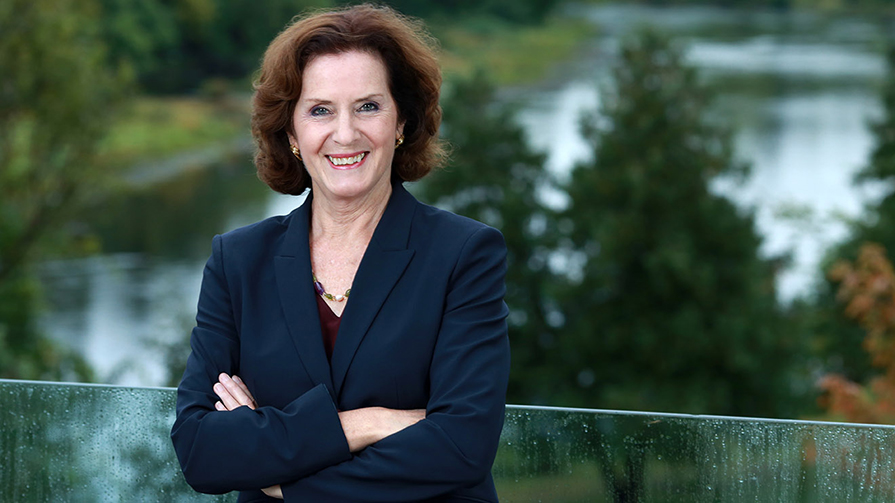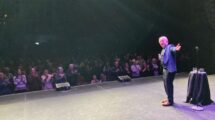By Jamie Portman and Photos by John Major
Off on a Mission
Veteran journalist Carol Off pulls no punches when it comes to the role of media today.
For Carol Off, a typical work day starts with her husband — award-winning novelist and former CBC documentary reporter, Linden McIntyre — arriving upstairs with a cup of tea.
“He clinks it down as loud as he can to get me awake!” she reports with a laugh. “I reach for the morning paper and my laptop. It’s about 6 or 6.30 and I start to read the news — the wire stories, the Twitter feeds, the New York Times, The Toronto Star, The Globe and Mail, National Post.”
It’s a matter of getting into gear for her daily stint before the microphones as host of the acclaimed CBC radio show, “As It Happens”. Carol, who has held the post for more than a decade, needs to know what’s happening right now in the world — be they major political events, environmental disasters, or quirky human-interest stories — and she and her colleagues have only a few hours to determine what newsmakers will make it onto her program that evening.
At 8 a.m., she’s listening to a BBC newscast over breakfast, and by 9.30 she is ready to leave her Toronto home and head for the CBC studios where crucial decisions must be made quickly. What will be the content of that evening’s 90-minute broadcast? Who will she be interviewing?
“We have a meeting and everybody brings ideas,” the veteran broadcaster explains. “We start with a blank slate. Only rarely is anything booked beforehand. Everybody brings pitches — including me. I don’t have any authority — it’s all a matter of the mix and the range. We decide what stories we’re chasing and then we start interviewing people whenever we can get them, in whatever time zone we’re in. And we keep doing that until 5.30 p.m. Toronto time when we begin going live to the East Coast.”
It can be a high-pressure few hours, but it’s a job she loves. And she does feel a huge weight of responsibility — not just to a program that marks its 50th anniversary this year, but also to its listeners.
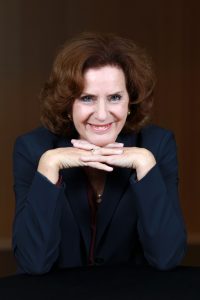
“It matters to people so much. People listen to every item. So, do you ask the right questions? Do you ask the questions people think should be asked? Do you have the right tone? Do you have the right guest? The feeling of responsibility that comes from that show is enormous.”
For all the pressures imposed by a daily broadcast fuelled by interviews with people around the world, “As It Happens” remains a comfort zone for Carol compared with her earlier life as a CBC correspondent filing reports from trouble spots like Afghanistan, Bosnia and Pakistan. She has known war and destruction first-hand. She has experienced personal danger and seen human suffering.
And when she talks about journalistic “responsibility” these days, she’s looking at the full compass of her professional career — and in particular, at the crisis confronting an Afghan family placed in jeopardy because of her reporting from the war zones.
That crisis haunted her for nearly a decade. That’s the time she spent — much of it overlapping with her duties on the show — trying to secure a safe haven for Asad Aryubwal, an idealistic Afghan who had believed he was doing the right thing when he sat down with Carol and a CBC documentary crew in 2002 to talk about his country’s notorious warlords. But that interview had catastrophic consequences when the most powerful warlord in the country dispatched death squads to kill Asad — forcing him to flee with his family to Pakistan.
Carol felt compelled to do everything in her power to bring Asad to safety in Canada, and she finally succeeded in 2015. She tells the story in her newest book, All We Leave Behind, published by Random House. It reads like a thriller, and talking about it now, its author reiterates the high stakes at play and the guilt she felt in realizing that Asad might be murdered as a result of her journalistic activities.
“I guess this book is a call for us to rethink how we function as journalists, how we encounter people, how we interact with them,” she says. “We don’t look back over our shoulders to see what we left behind after we left. We don’t look back to see what happened to the people we covered. And if we did, we’d find out more often than not, that we might have left a bit of a mess behind.”
Carol was a seasoned foreign correspondent when she and her CBC colleagues landed at Kabul Airport in 2002 to shoot a documentary about Afghanistan in the wake of 9/11 and the subsequent U.S. invasion of a country whose Taliban government had been harbouring Al Qaeda terrorists. In particular, they wanted to examine the growing power of the ferocious warlords who had been bankrolled by the U.S. The revelations of Asad Aryubwal, then 39, were crucial to the impact of the documentary.
“He was very willing, and he knew what he was doing,” Carol says. “I didn’t know that he had already been threatened, yet he still wanted to do it.
“There is a type of person in these situations who feels compelled to speak out, to tell the truth, who has no choice but to say what they know to be true. The world is full of people like Assad — the Chinese prisons are chock-a-block with people who felt they had something to say and therefore had to speak out. Everywhere in the world the prisons are full of these people — although they know the consequences, they have to speak. Asad was one of those people.”
However, Carol wonders now whether her own warning antennae were fully alert at the time.
Her years of interviewing people in war-zone situations have triggered moments when she has judged the risks too great — “where I’ve decided it’s too dangerous for them to tell me what they’re telling me, too dangerous for them to give their identity, too dangerous even to meet with me.”
She remembers meeting young people involved in the Arab Spring or uprisings in Ukraine or Georgia. “They were so idealistic. They wanted to speak up. And I decided against their own will not to let them do it because they didn’t understand what they were getting into.”
Asad had been determined to speak out, and the CBC gave him a platform. But because of that 2002 CBC documentary, he fell afoul of the brutal Dostrum, the most powerful and best-funded of the Afghan warlords. Which is why Asad and his family eventually had to flee for their lives to Pakistan.
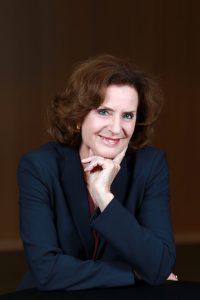
Early in 2008, Carol found herself in Pakistan covering the aftermath of Prime Minister Benazir Bhutto’s assassination. It was only then, when she sought out Asad and his family, that she understood the perils they faced. For her it was a devastating personal moment.
“I went to see them in this hotel in Islamabad. I didn’t know why they were there, and when I met them I had this sick feeling. I was sitting in that room, trying to absorb the consequences of the journalism I had done with this man — not just any consequences but the most desperate consequences possible. Someone’s life was being destroyed and there was no one he could turn to. Can you imagine what that feels like? It was deeply disturbing.”
If Carol is asked to name a seminal, life-changing event in her career, she will point to the content of her latest book.
“I thought I knew what I was doing, but this would force me to reconsider everything I thought a journalist did. We talk a lot about the right to protect our sources. We go to court to prevent police from gaining access to who are sources are — we do this all the time.”
But what about people like Asad who are not only willing to be a news source but to take huge personal risks in speaking out openly? “I’m not sure we really know how to protect sources,” Carol confesses. “I’m not sure we’ve thought enough about it. We’re so driven to get a story that we don’t think enough about the consequences of getting that story.”
For her, the professional barriers separating a journalist from the players in her story were dissolving because of Asad’s plight. She knew she had to do everything possible to get this family to Canada and out of danger.
“I didn’t know then how difficult it was going to be.” Carol gives a rueful laugh when she remembers her complacency. “I thought it was going to be a hell of a lot easier than it was, I just knew I had to get him out of the mess I’d put him in.”
Her initial response was to provide personal monetary help to a family in danger of being shoved back to Afghanistan at any time.
“It was so they could live. They were refugees. They were in Pakistan with no money and even though he came from a wealthy family, it was providing no support for him. And if they were caught doing anything the Pakistanis didn’t like, they would be deported.”
Then came the challenge of getting them to Canada. That took nearly nine years, “I thought it would be a cakewalk,” Carol smiles. “I knew what the United Nations refugee convention was and the criteria you needed to be classified as a refugee.” Her optimism was short-lived. She didn’t expect to hit frustrating bureaucratic roadblocks with UN agencies in the Middle East and with the Canadian government.
However, something even worse was lurking in the background. Beyond the bureaucratic bumbling, there was insidious evidence of a bribery culture at work.
“Hands down, Asad qualified for refugee status, and the difficulty of getting him there was bizarre to me until I learned that where we were going wrong was that we were not paying the bribes. I had the misfortune to be trying to help perhaps the most honest man on the sub-continent — a man who wouldn’t pay bribes. And I thought: I have to get him out of this — it’s too dangerous, even his kids are being attacked.”
When Carol learned of the Russian Mafia’s involvement in refugee scams, of a culture in which 50,000 U.S. dollars wired to a Moscow account would win you refugee status, she knew she had to write this book.
“I realized there were forces far beyond Pakistan involved and that this so-called refugee business was the Russian mob’s area of business. I thought this had to be exposed. I’m going to write a book about that.”
There’s a steely resolve underlying the quietness with which Carol has told this story. Yet she also strikes a note of cozy domesticity when she talks about her own grandchildren and the need to finish this interview in a downtown Toronto hotel soon, in order to get home and cook her husband Sunday dinner. She’s also in family mode when she talks about Asad, his wife and children. “They’re doing really well,” she says gently, and then without missing a beat she lists the ages of the five children. “I would hope that the book will help people realizes the value and beauty of becoming involved with the lives of other people. These people have changed me profoundly — knowing them, becoming friends with them.”
Meanwhile, the book’s primary villain — the frightening Abdul Rashid Dostum — is now vice-president of Afghanistan, still a “failed nation” in Carol’s view because of a resurgence in Taliban terrorism. “He has huge influence and power in that country, and he will become more powerful because the only resistance to the Taliban will be the warlords.”
Now it’s Carol Off, the informed observer of world affairs, who is returning to the forefront of this afternoon’s conversation — the Carol Off who presides over one of the most popular radio programs in Canada’s history. So how did she get to her present place in the country’s national life?
She was born in Winnipeg, left there when she was around 10 and continued growing up in Ottawa and later London, Ontario. She was the third oldest of seven children — a good preparation for life, she suggests with a grin. “It was a noisy childhood — chaotic. As it often is with two families, there were two families. The older kids were half out the door by the time the last ones were born. My father worked for the federal tax department as a special investigator. My mother was a happy housewife — but maybe not so happy when there were several of us in diapers!”
Carol was interested in writing from the time she was a youngster — “I always kept a diary and was always scribbling things.” And she was a voracious reader.
“We didn’t have a lot of books in the house, but we all had library cards,” she remembers. “We always had books — but they came from libraries.” Carol consumed the Bobbsey Twins and Nancy Drew series before graduating to Agatha Christie.
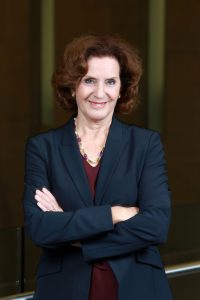 “I don’t remember how I made the route from reading Agatha Christie to reading Dostoevsky, but it seemed to happen rather quickly. And then, because of the time, there was this explosion in Canadian culture. So, Margaret Atwood very early on with The Circle Game and The Edible Woman, completely flipped my head around.”
“I don’t remember how I made the route from reading Agatha Christie to reading Dostoevsky, but it seemed to happen rather quickly. And then, because of the time, there was this explosion in Canadian culture. So, Margaret Atwood very early on with The Circle Game and The Edible Woman, completely flipped my head around.”
At the University of Western Ontario, where she studied English literature, she started writing about the arts for the campus newspaper. This led to doing arts reports from London for CBC Radio. The fact that she could actually earn money for such work, took her to Toronto where she continued covering the arts for the CBC more extensively.
She had a youthful ambition back then to be part of an “avant-garde” writing movement. She dreamed of making sales to one of “these weird little publications that were happening because of Canada Council grants.” A trip to India gave her an idea for an article, so she sent it off to a publication known to pay as much as $50 for a submission. The magazine promptly rejected it.
“They said — this is simply awful, you’ll have to rethink it. So, I went back and tried to reshape it again, making it more avant-garde, still thinking I could get it into this magazine. I sent it in again and they said — it’s worse than the last time, it’s not publishable. So, I’d done all this work for $50 I didn’t make.”
There’s a happy ending to this saga. Thinking she had nothing to lose, Carol sent it off to Maclean’s which bought it for $500.
It was then that Carol confronted her future realistically: “I realized I was a journalist.” She also saw the irony in her situation. That trip to India had been in search of material that she could write about creatively — material that would serve her literary aspirations. But she was discovering that this wasn’t where her talent lay.
“I kept falling into stories that I ended up writing as news accounts — which I didn’t want to do. I didn’t want to be a news writer. I didn’t want to be a journalist.”
Yet what she wrote kept emerging as journalism. So, she accepted the inevitable. “I eventually realized I wasn’t going to be a critic or a fiction writer or a poet or an avant-garde writer of any kind. I was a journalist.”
That India visit had yielded news stories for Maclean’s and Financial Post. At home, the CBC was reducing its commitment to arts programming, meaning that Carol, as a freelancer, would have to look for new sources of income. That Indian trip had whetted her appetite for overseas journalism. So, she took a huge gamble.
A house owned by Carol and her first husband was sold, and she took her share of the proceeds to pay off her student loan. And then she used what was left for an airplane ticket to get to Pakistan.
“I was going there on spec, hoping to restart this career that had completely died because I was no longer able to cover the arts. But I felt I had a knack for this foreign stuff and felt I might make a living at it.”
The year was 1986 and she was venturing into Muslim territory in which female journalists were an alien species.
“As soon as I walked through the airport gate, I thought — I have made a most serious mistake. I was terrified. All the women were covered. It was purdah. It was hostile. I told myself — I can’t function here as a single woman.”
But fortune of a grim sort was smiling on her. She received an urgent message from the CBC in Toronto. Palestinian terrorists had hi-jacked a Pan American Airlines plane at Karachi Airport. She was one of the very few western journalists on the ground. Could she cover this international crisis for Canadians?
“It was the first big story I ever wrote,” Carol says now. Her coverage paved the way for an illustrious career as a foreign correspondent. “But at first I didn’t know how to do it. The airport had shut down and there were only a couple of other reporters there.” However, those other journalists were generous in giving her advice and guidance — about such basics as how to file a story in an era when the internet didn’t exist, and the cellphone was a novelty.
Her reports got through, and soon, because she was one of the few Western correspondents on the spot, she was getting calls from the such high-profile American news anchors as Dan Rather and Peter Jennings. She had succeeded as a woman, in what was essentially a man’s world.
“It had been the policy of every news outlet, including the CBC, not to send women to war zones,” Carol says, again stressing that it was purely by chance that she was available to cover the Karachi hijacking. But her coverage of that event had started breaking the ice.
“Eventually a lot of news agencies saw the value of having women in these places,” Carol says. “Often we could get at stories where male reporters couldn’t.”
“Another ice-breaker was Sarajevo and Bosnia. Then I was sent to cover the 1991 Gulf War, but only to Tel Aviv because it was considered to be safe. I wasn’t to go to scary places like Saudi Arabia or Kuwait where I might end-up being scudded.”
But Tel Aviv wasn’t safe either. “I was staying at a hotel in Tel Aviv watching the scuds come in every night from Saddam Hussein’s arsenal!”
She had ceased to be a freelancer in 1987 when she accepted a job as a CBC correspondent attached to the Sunday Morning show. That’s how she met her future husband Linden MacIntyre, who would later become a fixture of the television series, The Fifth Estate.
“Linden was my national editor and the host of Sunday Morning. So, I reported to him. I still felt I was green with no experience at all, and we sort of got to know each other over the next year or so. My first marriage had ended, and eventually his marriage ended, and we got together. He has five children and I had one from that first marriage. So, there are lots of grandchildren!”
Carol now has four books to her credit — books that reflect her commitment to tough-minded reportage. The Ghosts of Medak Pocket, published in 2004, scrutinizes a Croation battle that, in her words, deals with events that Canada’s defence department “would never fully acknowledge had actually happened.” She later won accolades for the 2006 Bitter Chocolate: Investigating the Dark Side of the World’s Most Seductive Sweet.
With these books, as with her daily duties on As It Happens, it’s the human dimension that compels her. She is genuinely interested in people — and that even includes those who are tough interviews. Her session with Conrad Black was seminal in teaching her “how to interview people who are difficult to interview . . . and I think it ended well.”
Ask her to name one of her worst interviews and she doesn’t hesitate. “Evil Knievel. A horrible man. So misogynist, so awful to talk to. We thought it was going to be a funny interview, but this was a guy incapable of talking to a woman without being offensive.”
Carol always has to be prepared for the unexpected when she begins a conversation with someone who may be thousands of miles away.
“The really classic As It Happens interviews occur when you have no idea what someone is going to say,” she says. Recently she interviewed a woman who had been present at last October’s Las Vegas concert shooting that left 58 people dead. “She walked me through it, describing what was going on. I could feel the movie in her head — she was playing it as we talked. My face was streaming with tears, but I had to keep my focus because everything was coming back to her in a rush and she was all over the place. So, I had to keep her on some sort of line when everything she was saying was so difficult to listen to.”
That was an emotionally wrenching interview. But the show also often has its funny moments — for example when it made contact with a man who had taken his donkey to court: asked why he had done so, he replied that he wanted the court to take a good look at his ass.
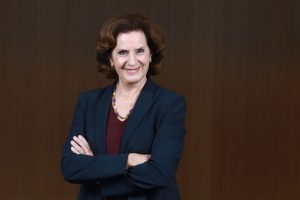
But there are also times when a story may seem humorous — but isn’t.
“This is something I learned very early on — be careful of your tone. You may think that this is some kind of funny interview, whereas it may be something that could take a different turn. We had an interview where a fireman had given mouth-to-mouth to a dog. It was considered to be a quirky interview — yet as soon as the guy came on, I realized he was describing how this dog had been saved from a fire and the kids were watching their dog die. So, this fireman decided he had to save its life. It was so moving.”
The As It Happens team takes pride in the fact that this much-loved CBC program is half a century old this year. But when Carol took on the hosting job in 2006, its future was uncertain. Chris Boyce, at the time CBC’s head of radio, warned her that her tenure might be short because Jian Ghomeshi, later to fall from grace, represented the future with his upcoming “Q” program.
“He didn’t think As It Happens was long for this planet. He told me that shows outlive their usefulness and that every resource was being put into Ghomeshi. He was the great hope of CBC — and as far as I could figure out, the sun rose out of his bottom. I was told that As It Happens was an old show and that old radio had outlived its usefulness.”
Nobody says that any more.
“We have more than turned that view around. The show has had a new life. In fact, I think all of radio has a new life. That’s because radio fits so well into the new technology. People listen to podcasts. They stream. They listen on phones. And we have a growing young audience.”



